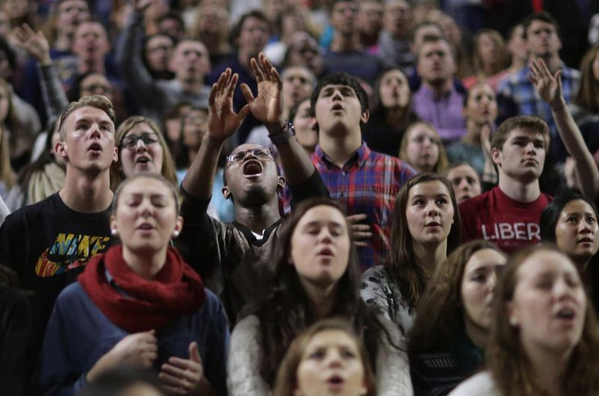Students at Liberty University in Lynchburg, Va., sing before Donald J. Trump delivers a speech on Jan. 18, 2016.
Donald Trump’s candidacy has sparked a civil war inside American Christianity.
Trump’s popularity among self-identified evangelical Christians has led national figures in American Christianity to question whether large swaths of the church even know what their faith teaches, and how it applies to public and political life.
The split is between a subset of evangelicals best categorized as “creedal” believers — those who take their faith most seriously and who oppose Trump. Less devout Christians, often described as “notional” or “cultural,” are more open to the businessman and GOP frontrunner. The majority of national evangelical leaders are on the side of creedal believers.
If Trump becomes the Republican nominee, many of these creedal evangelicals who have traditionally voted Republican say they would distance themselves from the GOP. But nobody knows whether this would result in evangelicals moving over to vote for the Democratic nominee or whether there would be a broader movement among conservatives to form a third party.
Nonetheless, many anti-Trump Christian leaders believe that the American church has been in decline for decades, leaving many casual Christians — for whom faith is more of a cultural identity rather than a day-to-day experience — vulnerable to Trump’s appeals to anger and resentment.
Anti-Trump evangelicals have not quite questioned the faith of Trump voters. But they’ve come close, arguing that Trump supporters are not applying Christian thinking and values to their decisions at the polls.
“For some evangelicals, Christianity is no longer shaping their politics,” Peter Wehner, a fellow at the Ethics and Public Policy Center, wrote recently. “With Mr. Trump in view, their faith lies subordinate.”
Mike Farris, the chancellor of Patrick Henry College, a Christian university in Northern Virginia, told me that Christians who “stay true to their faith” would vote for someone other than Trump.
And Russell Moore, head of the Southern Baptist Convention’s public policy arm, considers a vote for Trump “deeply inconsistent with an application of the Christian faith.” Moore wrote an op-ed in February for the Washington Post with the headline, “Why this election makes me hate the word ‘evangelical.’”
These Christian leaders see Trump as the antithesis of everything they and their faith stand for. Trump’s arrogance and brashness — including his statement that he has never had to ask God for forgiveness — contradict their belief in the importance of humility. His past infidelities, divorces and his long record of misogynistic comments stand in opposition to their high regard for personal character. They see Trump’s willingness to lie, blatantly and repeatedly, as morally wrong, alarming and insulting.
Source: Jon Ward, www.yahoo.com
 Listen Online
Listen Online Watch Online
Watch Online Find a Station in Your Area
Find a Station in Your Area








 Listen Now
Listen Now Watch Online
Watch Online
